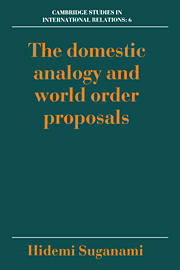Book contents
- Frontmatter
- Contents
- Acknowledgements
- Introduction
- 1 The domestic analogy debate: a preliminary outline
- 2 The range and types of the domestic analogy
- 3 Some nineteenth-century examples
- 4 Contending doctrines of the Hague Peace Conferences period
- 5 The impact of the Great War
- 6 The effect of the failure of the League on attitudes towards the domestic analogy
- 7 The domestic analogy in the establishment of the United Nations
- 8 The domestic analogy in contemporary international thought
- 9 The domestic analogy and world order proposals: typology and appraisal
- Conclusion
- Notes
- References
- Index of personal names
- Subject index
8 - The domestic analogy in contemporary international thought
Published online by Cambridge University Press: 18 December 2009
- Frontmatter
- Contents
- Acknowledgements
- Introduction
- 1 The domestic analogy debate: a preliminary outline
- 2 The range and types of the domestic analogy
- 3 Some nineteenth-century examples
- 4 Contending doctrines of the Hague Peace Conferences period
- 5 The impact of the Great War
- 6 The effect of the failure of the League on attitudes towards the domestic analogy
- 7 The domestic analogy in the establishment of the United Nations
- 8 The domestic analogy in contemporary international thought
- 9 The domestic analogy and world order proposals: typology and appraisal
- Conclusion
- Notes
- References
- Index of personal names
- Subject index
Summary
In chapter 6 we identified four dominant approaches to world order which emerged against the background of the perceived inadequacies and the eventual collapse of the League of Nations. In the light of these four approaches, we discussed in chapter 7 the place of the domestic analogy in the birth process of the United Nations. If, as we saw, a reformed-League idea and welfare internationalism were the two major influences in the shaping of the new world organization, these and the other two approaches all continue to find support among the writers and practitioners of the postwar era, although some modified or new approaches have also emerged.
A reformed-UN approach within the bounds of legalism
Clark and Sohn's oft-cited work, World peace through world law shows that the idea of improving on the League, and now on the United Nations, but remaining within the old legalistic mould, still continues to find many adherents. A distinguished Harvard-educated legal practitioner, Grenville Clark has engaged in the study of world order since before the war. A proposal contained in a short pamphlet he published in 1940 under the title A memorandum with regard to a new effort to organize peace was in many ways an adaptation of the American Constitution, and advocated the unification of democratic countries. A generation younger than Clark, Louis Sohn has taught courses such as ‘United Nations law’ and ‘Problems in the development of world order’ since 1951 at the Harvard Law School (Clark and Sohn 1966, lii).
- Type
- Chapter
- Information
- The Domestic Analogy and World Order Proposals , pp. 129 - 164Publisher: Cambridge University PressPrint publication year: 1989

